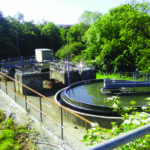Transformed leakage technology can tackle resource challenge
There has been a transformation in leakage technology over the past five years, with new systems now available that improve performance, keeping more water...
Pumps bolster Rotherham flood resilience
The centre of the town of Rotherham in South Yorkshire suffered significant flooding following extreme rainfall in June 2007 and November 2019, affecting hundreds...
Reforms to flood funding and investment to protect farming communities
The UK government says it is bolstering England’s resilience to flooding through additional financial support to farmers and rural communities, as well as refreshing...
Pioneering 3D printing project shares successes
Leaders of a pioneering project to develop 3D printed infrastructure and components for the water sector will be sharing insights from five years of...
Small and smart actuator gets explosion-proof rating
Electric actuator manufacturer AUMA has added an explosion-proof version to its successful PROFOX actuator series.
“The new PROFOX-X actuators expand all the benefits of our...
Pathogens which cling to microplastics may survive wastewater treatment
Wastewater treatment fails to kill several human pathogens when they hide out on microplastics in the water, reports a new study appearing in the...
Preventative pump maintenance reduces downtime and risk
Now that industrial companies face being hit with unlimited fines for pollution incidents, outsourcing pump maintenance to specialist contractors can provide security and peace...
Jessica Middlemiss hired to help deliver cutting-edge technology
This article contains paid for content produced in collaboration with PurAffinity.
Puraffinity, which develops precision technologies to remove toxic “forever chemicals” perfluoroalkyl and polyfluoroalkyl substances...
A new polypropylene ball float valve, the PolyPro 015
This article contains paid for content produced in collaboration with PVL.
PVL introduce to the market the new PolyPro 015 Ball Float Valve (½") ...
Hydraulic valve delivers performance
A new single-stage, four-way hydraulic valve from Danfoss Power Solutions features a round solenoid design and delivers high power capacity and superior durability. The...
Submersible transfers sand-heavy media
Sales engineers from T-T Pumps have recently worked with a client in the Maldives to specify a submersible slurry pump for use in the...
Electric dewatering pumps optimise lithium extraction at Chilean mine
A mine in Northern Chile has seemingly doubled its lithium extraction rate since installing WEDA drainage pumps from Atlas Copco. Here, the latter firm...
Surface attrition slowdown
Vogelsang, the inventor of the rotary lobe pump with elastomer-coated lobes, showcased its advanced wastewater solutions at WEFTEC in New Orleans in early...
Supply Framework win
A framework for the supply of electric actuators has been won by AUMA Actuators Limited following a competitive tendering process issued by water and...
Organic optimisation
A Bredel hose pump has replaced a faulty progressive cavity pump at a water treatment plant in the Netherlands. Pumps manufacturer Watson Marlow...
Solar pumps at Moffat borehole
A solar scheme in Moffat is now helping power the pumps which provide water to the town’s water treatment works.
The £307,000 project has...
Pollution prevention: Dealing with an emergency
Pump Supplies describes a recent emergency installation undertaken for a water industry client.
While our projects can often be months or even years in...
Ensuring flow compliance at Fowey sewage works
Small wastewater treatment works (WwTWs) frequently present significant physical challenges for instrumentation and control engineers. However, a compliant flow measurement facility has been installed...
Preparing for the worst
A new portable area monitor is said to be the only direct-to-cloud area monitor capable of detecting up to eight gases and gamma radiation.
The...
Closing Pandora’s box: A new book explores the science of sewage
Sewage: It's a subject whose complexities are not to be underestimated, but which are increasingly in need of being communicated to the public. A...





















